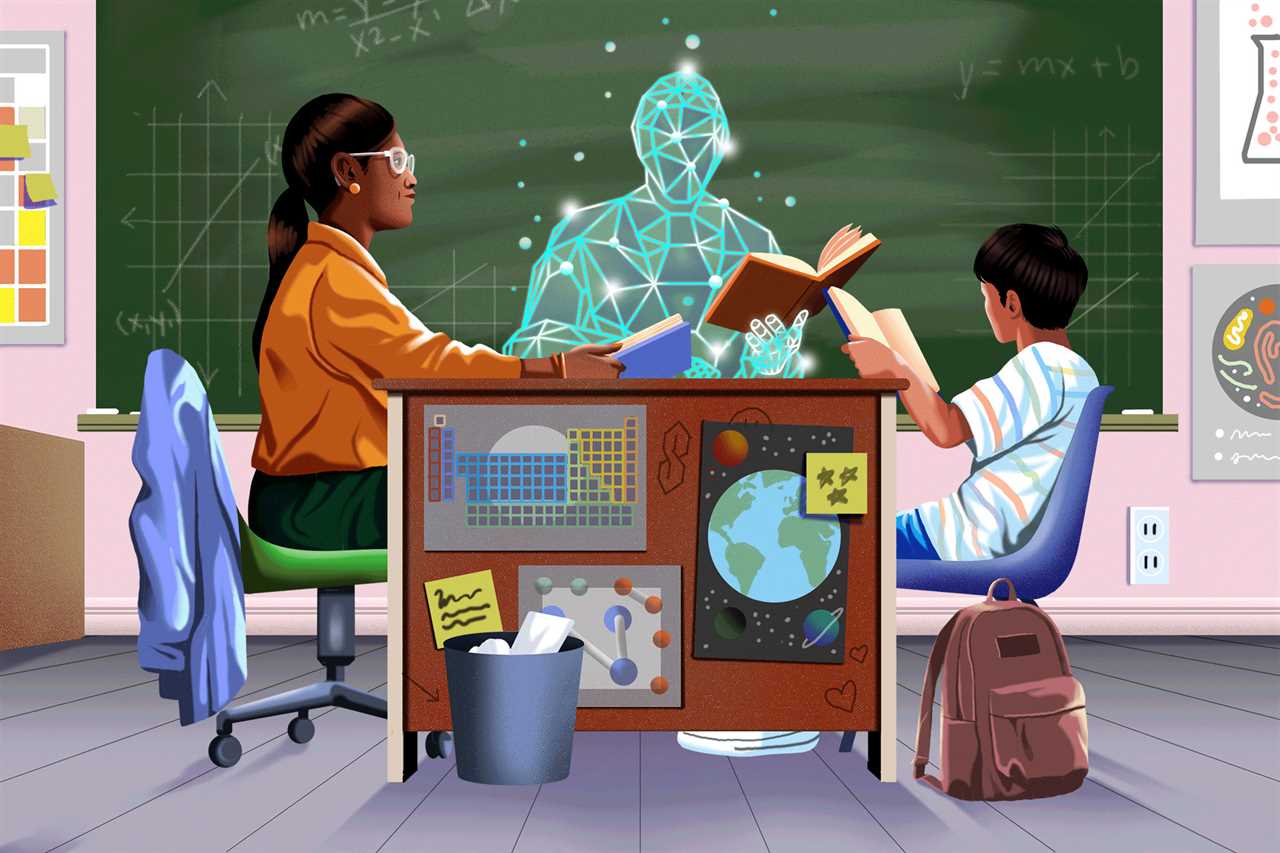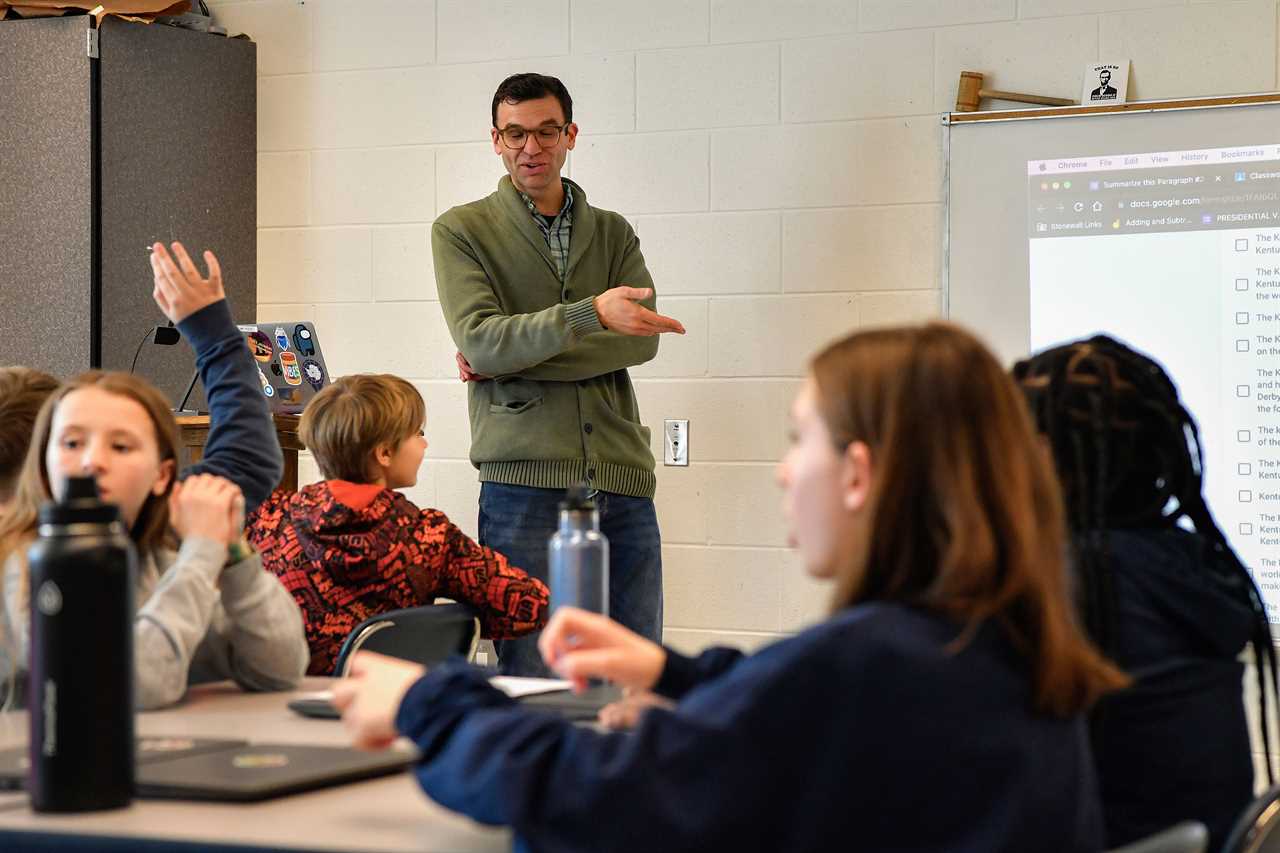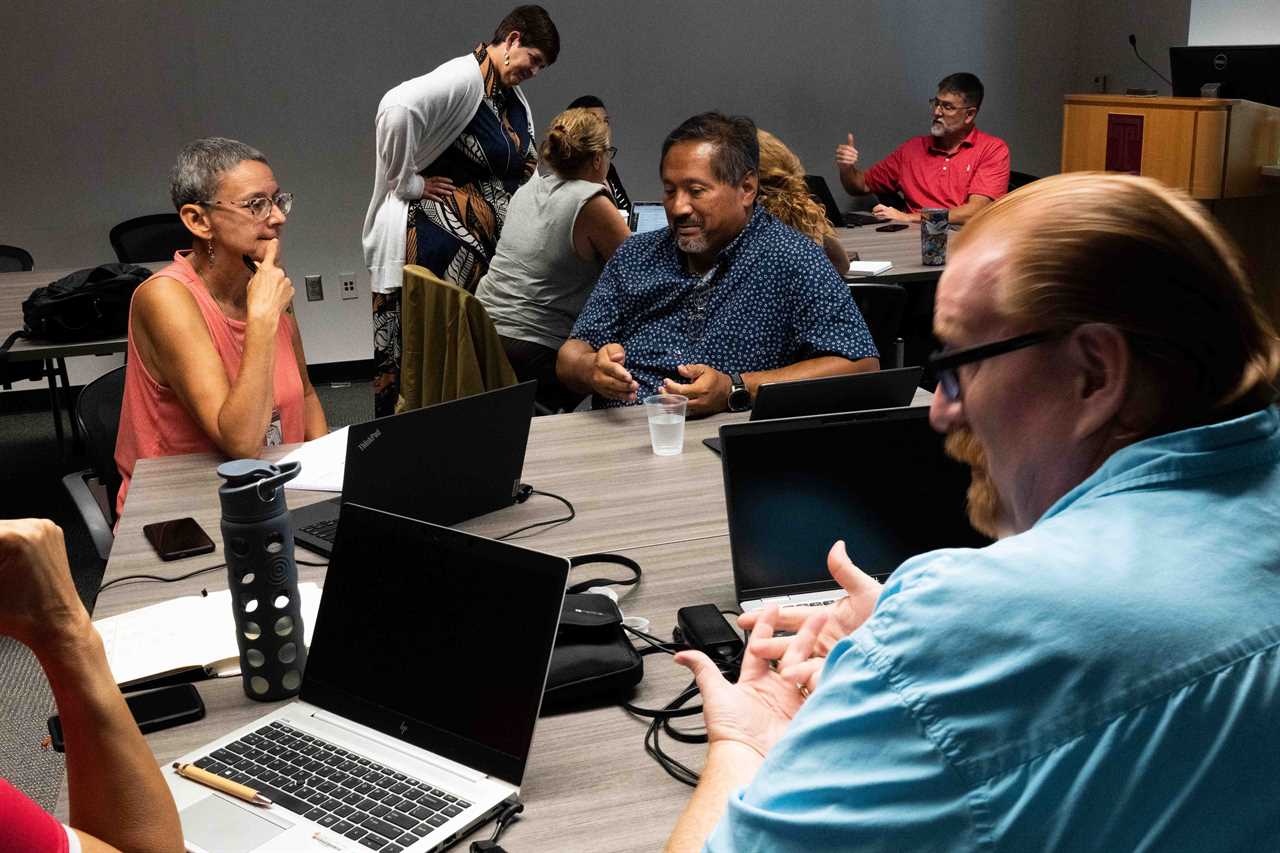
Many school districts spent the last academic year trying to seal students off from artificial intelligence. Now, they're racing to establish AI-friendly classrooms as a new school year kicks off.
They’ve crafted rules for AI use among students and trained teachers on how to fuse the technology into daily learning. The reason for the dramatic shift: a realization that it’s better to harness the rapidly evolving technology than futilely attempt to insulate against it.
“It's like banning TikTok” on school internet, said Kip Glazer, principal of Mountain View High School in Silicon Valley, who holds a doctorate in learning technologies. “No, it's not working. So silly. Come on, adults! You look foolish.”
The November release of ChatGPT — a free bot that can solve calculus equations, write term papers and translate Spanish — upended education seemingly overnight. Students from middle school to college tinkered with chatbots, using them to help with homework or complete assignments altogether, spurring some school systems to block their use.
Now, state by state, more school leaders are setting rules around acceptable use and preaching the benefits of the emergent technology while Washington weighs national AI regulations for K-12 classrooms.
“The jobs of the future, this world where AI exists, are going to demand skills that we haven’t even dreamed up yet,” New York State United Teachers President Melinda Person said in an interview. “We want to make sure that our instruction provides kids with the tools they need for that future job market.”
A majority of teachers support leaning into the fast-developing tech. About 61 percent of teachers think ChatGPT will have “legitimate educational uses that we cannot ignore,” according to a national survey commissioned by the Walton Family Foundation from progressive pollster Impact Research.
In New York City, Schools Chancellor David Banks announced in May that the Department of Education would support public schools as they navigate ChatGPT after initially banning the software earlier in the year. Since then, educators have been thinking about how to incorporate AI into their lessons. The department’s Digital Learning and Innovation team worked with the International Society for Technology in Education to offer a 15-hour course for educators.
Some high school educators have given students ChatGPT projects, such as requesting the bot write poetry in a particular style “and then analyzing the product that they’ve received,” said Janella T. Hinds, vice president for academic high schools at the United Federation of Teachers.
.

Administrators in the heart of Silicon Valley have been developing rules that would allow for AI use only when teachers explicitly encourage it and mandate that students cite ChatGPT use in their work.
Like New York, school districts in Los Angeles and Seattle banned ChatGPT on district devices soon after its release. While Los Angeles Unified’s ban still stands, the country’s second-largest district acknowledged the technology’s upside by deploying an education-specific chatbot named “Ed” in 100 schools when classes resumed last week.
The tech, accessible on smartphones, will expand to all district schools within six months and remind students to complete assignments and help parents access students’ grades and attendance.
Superintendent Alberto Carvalho touted the software as an around-the-clock resource for parents and students at a school year kickoff event this month. “That voice that speaks to you early in the morning, late in the evening, wakes you up, nudges you, reminds you of your attendance, your homework,” Carvalho said.
The International Baccalaureate program, which is offered in nearly 2,000 schools across the nation, was among the first to announce it would not ban the technology in early 2023. IB curriculum encompasses college-preparatory courses that provide a growing alternative to Advanced Placement programs.
“AI will be affecting societies to a large extent, and they are so strongly influencing the basic ways of how we make sense of reality, how we know things, and how we create things, that it would be a mistake if we would leave schools out of that kind of development,” Olli-Pekka Heinonen, the director general of the International Baccalaureate program, said in an interview.
The growing embrace of AI technology by educators doesn’t mean that they’re ignoring concerns about cheating.
Some schools, including Glazer’s Mountain View High School, have purchased software meant to detect use of AI in essay writing and other assignments. But even the best products can’t always accurately identify what’s authentic.
“There are some companies right now that claim that they can detect AI,” said Stanford University education researcher H. Alix Gallagher in an interview. “I would recommend suspicion about the promises of catching cheating. And anything that says we can preserve the status quo is, I think, untrue.”
Federal officials and national education groups are also wrestling with how to strike a balance between embracing AI’s potential and protecting academic rigor and student privacy.
The U.S. Education Department in May released guidance highlighting the potential for AI to personalize learning — especially for English language learners — while also raising concerns about technology companies surveilling students and risking their privacy.
But education-specific national regulations of the technology have yet to emerge.

Rep. Ted Lieu (D-Calif.), one of Congress’ most vocal proponents for AI industry oversight, said “teachers and school administrators should be skeptical of using generative AI in the classrooms right now” in an interview. But it’s too soon, he said, for Congress to pass specific regulations of the nascent technology’s use in schools.
“The federal government can provide guidance, provide recommendations, and in extreme cases, the federal government could provide guardrails if in fact those are needed,” said Lieu. “It is just a little early right now to tell what guardrails may be needed or not.”
The nation’s second-largest teachers union, though, is pursuing stringent rules on Capitol Hill. In June, American Federation of Teachers officials gathered in Washington and called on governments to “swiftly develop, pass and implement strict regulations” on artificial intelligence.
AFT President Randi Weingarten told union officials that school attempts to ban the technology will fail, as she praised European Union privacy and security regulations that are well ahead of the U.S.
“We need safeguards — particularly on disinformation, misinformation and privacy,” Weingarten said in an interview,
The National Association of Secondary School Principals isn’t yet advocating for specific regulations, CEO Ronn Nozoe said. But he stressed the importance of training teachers on AI use and said cuts to professional development funding in House budget legislation could limit schools’ ability to integrate AI.
Other national nonprofits are helping with trainings. The International Society for Technology in Education, an organization that works to boost the use of technology in education, has already offered an AI explorations course to around 2,800 educators, said CEO Richard Culatta.
“They do a lot of sharing about what’s working, what’s not, answering questions,” Culatta said of the trainings.
Advocates of such trainings argue they help teachers incorporate AI into lessons and prepare students for jobs in tech.
“Kids are going to be graduating into a world where using this well will get them the jobs that will make them the money that they want to make,” said Barbara Nemko, superintendent of the Napa County Office of Education, located about 100 miles North of Silicon Valley.
The enthusiasm for generative AI among educators is something that Jeremy Roschelle, executive director of learning sciences and research at Digital Promise, a national education research nonprofit, has seen ramp up in the past year. The group has worked with schools and federal agencies to help them navigate the technology’s emergence.
“We need to create safe ways for teachers to continue their explorations,” Roschelle said. “The only way we’re going to be smart about AI in education is by having a very large pool of informed, innovative educators who are making sense of it every day on the ground and the only way we get that is by letting people explore and try it.”
Mackenzie Wilkes and Katelyn Cordero contributed to this report.
----------------------------------------
By: Blake Jones, Madina Touré and Juan Perez Jr.
Title: What’s in this school year? AI, chatbots and ChatGPT
Sourced From: www.politico.com/news/2023/08/23/chatgpt-ai-chatbots-in-classrooms-00111662
Published Date: Wed, 23 Aug 2023 04:00:00 EST
Did you miss our previous article...
https://consumernewsnetwork.com/politics-us/doj-whistleblower-you-have-left-the-door-wide-open-for-fraud






